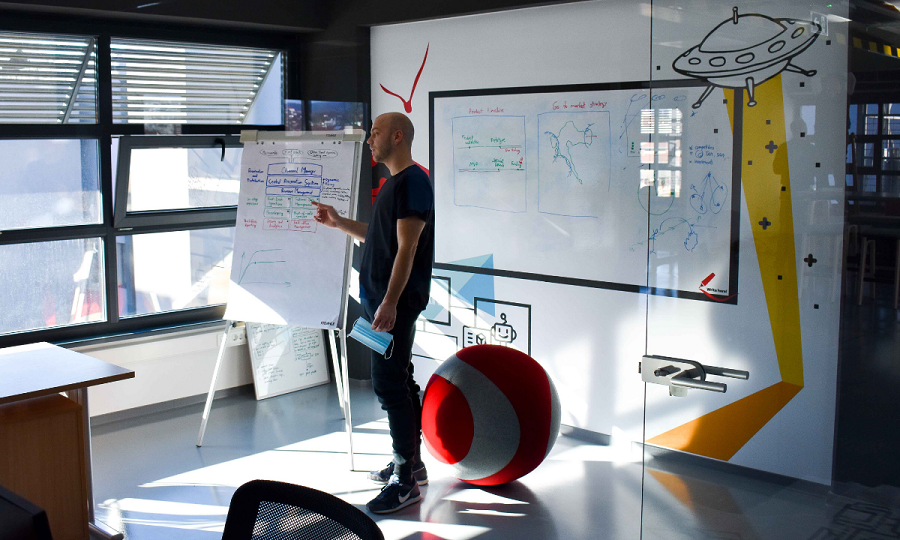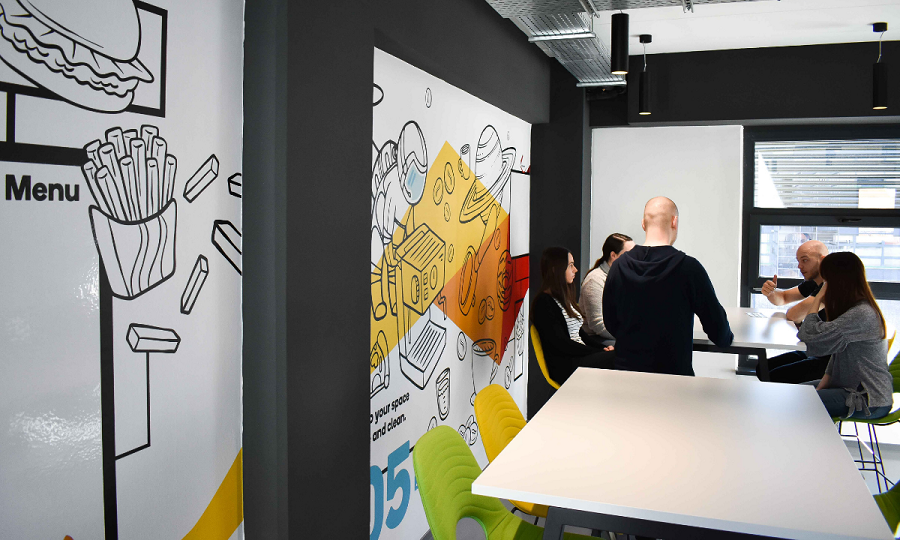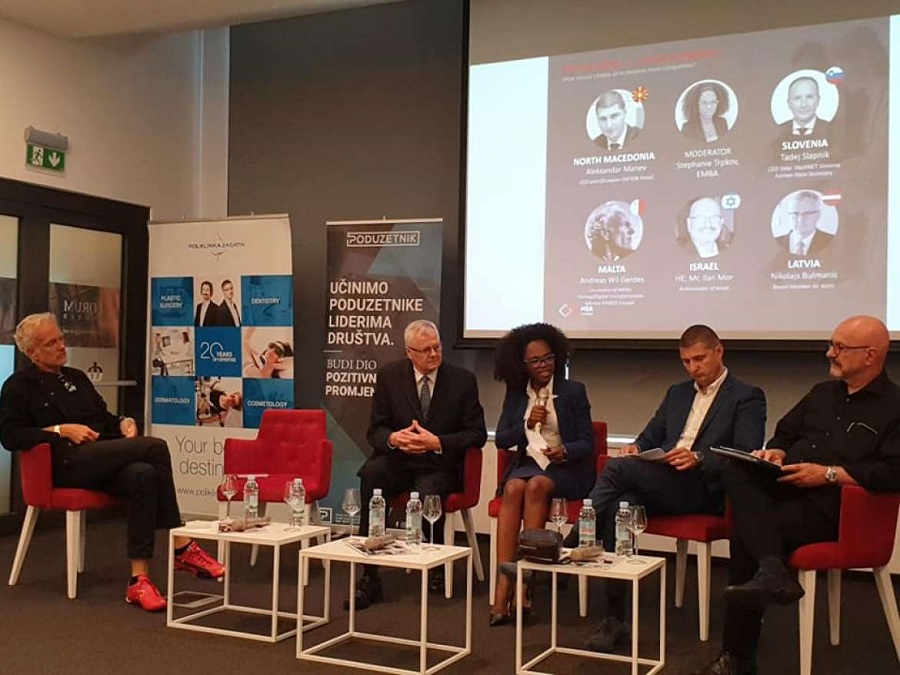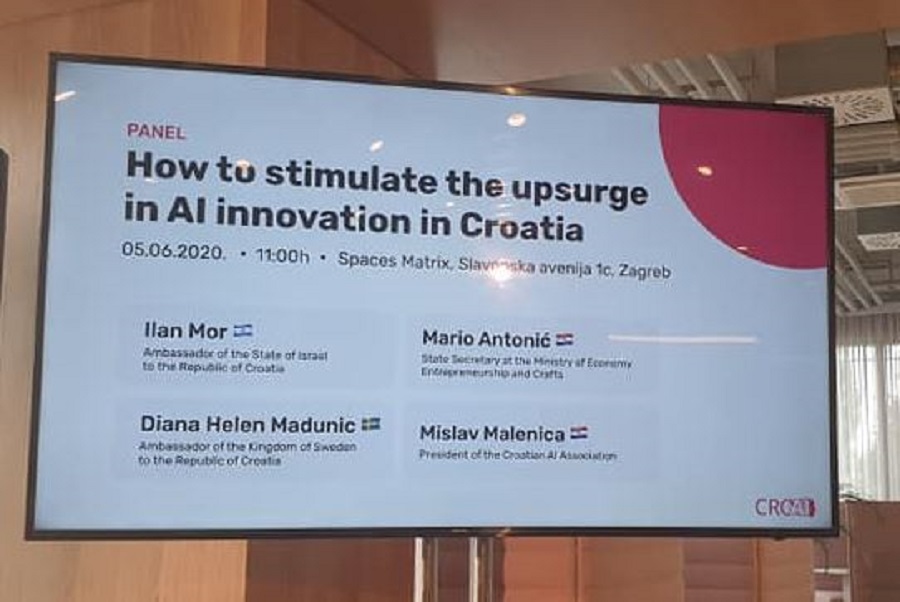BIRD, Croatia's First AI Startup Incubator with International Reach, Officially Opens
February 9, 2021 - BIRD Incubator, the first Croatian incubator for teams and projects related to artificial intelligence, machine learning and data analytics, officially opened its doors on February 9, 2021, and the first startup teams began incubation in late 2020.
As of today, the Croatian technology scene is richer for a new startup incubator that specializes in projects based on the development of artificial intelligence. The BIRD Incubator was started by the company Poslovna inteligencija at Petračićeva 4 in Zagreb, where a visually impressive new space of 450 square meters is located. The official opening was organized online due to the coronavirus pandemic and due to the participation of a large number of international partners, some of whom even come from India.

"We are very happy that we have officially launched the BIRD Incubator. Since the initial idea in April last year, there has been a lot of preparation, especially around arranging the new space. Now that everything is in place and the teams are selected, we can’t wait to see the first results. We believe we launched the Incubator at the right time. The community gathered around the association CroAI - Croatian Association for Artificial Intelligence, initiated a large number of activities which resulted in greater interest of the wider community in the field of artificial intelligence. Thus was born the idea of starting an incubator that would receive not only Croatian, but also regional, European and world startups that have artificial intelligence at the core of development. We see this as our contribution to the movement that will place Croatia on the European map of artificial intelligence,” said Dražen Oreščanin, President of the Management Board of Business Intelligence and one of the initiators of the BIRD Incubator.

At the official opening, the first seven startup teams were presented. Those teams were admitted to the Incubator after going to through the application process and the interviews with the board members of the Incubator, composed of key people from Business Intelligence and mentors. The teams, most of which started the incubation process at the end of 2020, come from Croatia, while the international note is given by an experienced team from India, Marksman digital, which is developing a platform for selling and annotating large data sets such as images that will train algorithms and models of artificial intelligence. Teams from Croatia are: AI-zyme who, with the help of artificial intelligence, are looking for new sequences of proteins and enzymes for use in medicine and industry; Merity, which automates employee data collection and satisfaction measurement, and provides advanced analytics with recommendations for improving business processes; NeolightAI which creates a system for managing guest satisfaction in tourism and communication with a virtual agent; Platepay which allows payment by car license plates and geolocation marketing based on analytics; SciBiz, which is building an advanced platform for the sale of innovative materials and connecting scientific institutions and businesses, and TriCor, whose product uses technology and sensors from clothing to prevent cardiovascular disease.
“We filled the capacity of the BIRD incubator very quickly. Startup teams that recognize the great value of what we offer and that create products related to artificial intelligence, machine learning and data analytics, regardless of the business area, are free to contact us via the website https://bird-incubator.com/apply/. The incubator works on the principle of hop-on / hop-off system. When a team worth entering the Incubator appears and if there is room, we accept it for six months for the duration of the program in which the team creates a product from the initial idea or prototype ready to receive investment and / or enter the market,” said Incubator Manager Željko Krizmanić.

Startup teams will achieve the greatest value through a relationship and work with the incubator's mentors, from whom they will be able to "pick up" a large number of tips on their entrepreneurial journey. These mentors include pioneers of the technology and startup scene from Croatia and the world, as well as people with extensive experience in the fields of marketing, law, investment and finance.
Through the opening program, certain groups of partners were presented as they have been key to this success and achievement of goals. These are corporate partners, Atlantic Group and United Group, for which BIRD will be an "external" center for generating innovative ideas. There are also partners from the scientific community, FER, FOI and FSB, faculties of technology whose students will work on project assignments of corporate partners, and this cooperation will be evaluated as a diploma thesis. Other important partners include two IT communities, CroAI and CISEx, with which the BIRD incubator plans community events, and "friend incubators", Algebra LAB and the Krapina-Zagorje County Entrepreneurship Center, with which startup teams and educational programs are "shared". The technology is taken care of by two technology vendors, IBM and Vertica, and there is a principled cooperation with Microsoft and Google.
As it is important for all startups to be recognized by investors, and at the same time the ultimate goal of incubation is the willingness of investors to invest in a particular project, the Incubator has signed cooperation with WC funds from Croatia, Europe and the world. Investors who will monitor the development of the teams are: Fil Rouge Capital, Feelsgood Captial, South Central Ventures (Croatia), Day One Capital, Eleven Ventures, LAUNCHub Ventures, Next Road Ventures (Europe), Hitchikers Ventures (Canada), Batalla Family Office (US) and Spring Up Capital (India).
The founders additionally point out that social responsibility has been built into the philosophy of Business Intelligence from the beginning. Business success is viewed through contribution to the community. The incubator is the latest in a series of projects by which Poslovna inteligencija wants to help the technology community grow. By doing so, they want to influence the environment in Croatia in which young people can see the future.
Interview: Terence Tse 'What Croatia Needs to Put Itself on the AI Map'
February 4, 2021 - Interview with Terence Tse from the Nexus FrontierTech, visiting professor at Cotrugli Business School, about the discussion he had with CroAI members Hajdi Cenan and Marijana Šarolić Robić.
In your experience, what is happening with AI on the European level?
For the past several years, the European Commission has been producing numerous policy documents with the single aim of promoting the development and deployment of artificial intelligence (AI) based on “European values and rules” among the member states. This initiative is undoubtedly and urgently needed as AI technologies are evolving at neck-breaking speed. Furthermore, the ramifications and implementations that this technology has in shaping our economies and societies in the coming decades are expected to be vast.
Yet, despite such unquestionably commendable effort in leading a high-level discussion and making a long list of recommendations on the role of AI should play in the industry policy the industry policy of individual member states, there remains seemingly a lack of concrete ideas as to how individual governments can build up their own AI industries.
Does this matter to Croatia, and what should we do?
This matters a lot to a country like Croatia – one that does has got neither a large industrial nor domestic customer base. Countries as such must become agile and stay at the technological forefront to be better able to compete on a global basis. Governments of these countries must devise a simple and proper policy framework to allow and empower companies and communities to have more flexibility in the development and deployment of AI technologies. Drawing on our experience from working in the AI field, this short brief intends to offer insights into some of the current developments in this field, which in turn will hopefully be useful in informing the right national policy for the Croatian government to build up its AI capabilities.
How are bigger countries reacting?
Governments in larger economies in Europe such as France, Germany and the UK have all made AI a key industry focus. The result is that they have got an earlier start on the development and deployment of AI. Contrast this to where Croatia is on the subject. At the time of writing, the government is expected to have completed the final version of the national strategy for AI. It is among a small handful of countries out of the 31 EU member states that has yet to establish an official policy.
As can be expected, the private sector does not wait. More and more Croatian AI companies have been emerging in the past years. As an illustration, the Croatian AI Association (CroAI), created in December 2019, has now got 71 companies as a member, with an additional 50 supporting members that are either individuals or academic institutions. For a fledging industry, these may be huge figures. But such growth trajectory is not insignificant as it clearly demonstrates the country has got the right mindset, talent and resources to thrive in this area. While this is a good start, for AI companies to thrive, it is necessary to have a more coherent collective effort.
But we have a number of companies that are devloping AI projects?
A telling tale is where the very few AI companies in the country ended up: they often do business abroad and consequently applying their expertise overseas and hiring staff from the countries in which the transactions take place. There is no doubt that export is a good source of income for Croatia. However, selling services abroad can neither promote domestic consumption and investments of AI nor the AI capabilities of the country effectively. Indeed, taking a broader economic view, Croatia has got a good training and education system that produces a lot of qualified engineers and developers. Yet, the country has been suffering chronically for not being able to create enough jobs created to absorb the talent produced.
What is Croatia's potential and should be done to achieve it?
In addition to the EU’s efforts in technological development via policy framework, we would like to offer a few ideas that can potentially set a “bottom-up” agenda and guideline to achieve the goal.
Have conversations, not merely top-down. With the right policy and actions, Croatia has got the potential
become a regional AI leader, if not beyond. While the EU has been eager to push forward the development of AI, its focus is often restricted to establishing the right environment and regulations, which is not necessarily offering the quickest route. Indeed, the discussions of ideas should be broadened beyond the policy framework mindset. For instance, the ministry developing the national strategy should involve all interested parties and not just National Digital Economy Council's Working Group and the few private companies.
What are the traps we need to avoid in creatin AI value?
Focus on the real side of AI. It is very easy to have fallen into the following misconception trap about AI: it is all about AI models involving only AI researchers and scientists. In business reality, however, deploying this technology into company operations involve a much wider set of competence and job roles. The most critical success factor in the development of AI is not the strength (e.g. accuracy) of the models – the “brain”. Instead, it is the overall IT system in which the model is only one of the many components, with the so-called AI Operations (AIOps) creating and supporting it. AIOps involve system developers and engineers – and not data scientists – who are skilled at embedding AI models into a well-oiled production environment, which, in turn, must work flawlessly with companies existing IT infrastructure. Put differently, the way to genuinely extract value of AI is not the model development but rather having a robust overall technology system.
Viewing from this vantage point, the essence of AI conversations should be extended to pushing for developments in the capabilities to run AIOps. In doing so, not only can Croatia develop more comprehensive and pragmatic AI offerings; it can also capitalise on the full potential of the developers and engineers churned out by the education system. A case in point is the London-based AI company Nexus FrontierTech that hires some 80 system developers and engineers in Hanoi, Vietnam, essentially helping the country to upgrade the skillsets of the workforce there.
Is it only about developers and engineers?
Think about the business side of technologies. It is important to note that not all activities related to AI involves people with technical backgrounds. Typically, a business that is considering the deployment of AI in its own activities will have to consider issues and requirements related to data, skills, cost, integration and stakeholder education. Additionally, just as important, if not more, is the ability to strategise, plan for and executive AI projects. Having a strong AI project management ability is mission critical as it will feed into solving many problems across the board. Much of the competencies to overcome these challenges are far more about business and less about technologies or technical skills. Taking this view means that there are plenty of scope and opportunities – as well as work to do – for Croatia to enhance its AI capabilities and therefore general competitiveness.
What would be your advice to Croatian Government?
Instead of a 400-page strategy that seeks to obtain EU funding, there should merely be a set of strategic guideline that can steer and promote the developments of AI start-ups as well as the wide-spread application of the technology. This should be developed by taking into account not just the AI technology itself but also the required business competencies for realistically deploying and eveloping the capabilities. If Croatia were to take on a broader view of AI – much wider than the focus of the EU – it will have a far better change of thriving and excelling in this up and coming technology sector and put the country on the AI map.
Introducing the Concept of National AI Capital
September 3, 2020 - The world of AI is transforming the way we do things. Meet the new concept of National AI Capital.
In my Human Resources career, I was working on different Human Capital related topics, from different angles. Since it is obvious that we are globally becoming an economy that is much more dependent on human capital, then on any other form of capital, I spent some time researching it a bit deeper. Some of my thoughts will be published soon. But as a part of the Human Capital story, I also researched and wrote about different aspects of Artificial Intelligence and how it would impact individuals, organizations, societies and nations / countries.
Based on that, I coined a new concept – National AI Capital, or NAIC in short. It is related in some ways with Human Capital, and in a complex relationship that needs to be explored further.
The working definition would be:
NAIC – the country’s capacity to apply and develop, and cope with the challenges of various artificial intelligence systems, in order to increase the country’s social and economic well-being and competitiveness.
We already know that countries are differentiating based on their Human Capital Index Map – measured by the World Economic Forum and that it will make even bigger differences if some countries start lagging back even more.
It is not hard to predict that development in different AI practices and the implementation of those projects could give an exponential advantage to some countries or companies. A short overview is available in my article, Use of Artificial Intelligence: Comparison between countries. Because of that, it would be reasonable to address this issue globally, and as soon as possible, while the differences are not dramatic.
Strategies to address that problem, will give some answers to many questions. Who is now, and who will be responsible for the creation of AI capital of a country? Today, when we have 9 corporations doing an enormous job in the AI field, we need to predict or empower other stakeholders to do their part. To differentiate the AI power. Is it going to be Academia and different Universities, AI start-ups funded by more and more venture capital, Government institutions and large scale projects or all of them in some amount, will be answered differently in every country or continent.
And of course, there are different fields of AI that some country could put their focus on. Depending on their specific needs and resources, they could focus on – Healthcare, Marketing, Business Intelligence, Security, Finance, Military, Customer Experience or Education segment, which I mentioned in one of my previous articles: AI Education System: What Can We Expect and Hope for in Croatia? What Can We Expect and Hope for in Croatia?)
As for the initial measurement of NAIC, the methodology will be finished and polished in the next months, since I am working with many organizations and individuals from a few countries to finalize some details and gather data from the initial survey that you can check here!
Assumptions were that those factors could be taken into consideration for equation or profile of a single country:
- number of engineers/developers working in the field (in the country)
- number of engineers/developers dealing with related fields (in the country)
- number of AI start-ups (of that country)
- number of national AI development projects
- level of investment in AI projects (in the country)
- number of AI system implementations at the state level
- the amount of data collected and structured that can be used to develop AI
- connection of AI scene with world projects and knowledge exchange
- percentage (%) of jobs substituted by AI and automatization
- amount of scientific/research papers
- national long term AI vision and strategy
- something else ____
The final goal is to have NAIC definition similar to the OECD definition of Human capital - "knowledge, skills, competencies and characteristics of individuals that facilitate the creation of personal, social and economic well-being. But also the practical methodology that can measure NAIC and compare countries, and give them as feedback useful information to develop and align their national AI and HC strategies.
Take part in the initial National AI Capital survey here.
Aco Momcilovic
08/2020
FutureHR
For the latest travel info, bookmark our main travel info article, which is updated daily.
Read the Croatian Travel Update in your language - now available in 24 languages
What Happens When Israel, Sweden & Croatia Compare Notes on AI Strategy?
June 18, 2020 - Senior representatives from Croatia, Israel and Sweden gathered in Zagreb at a CroAI conference on the reaction to the EU white paper on AI strategy. There are few finer examples of the competence of the current Croatian administration.
Just over a year ago, MBA Croatia organised a Croatia 2.0 conference in Zagreb called How to Be Globally Competitive from Croatia. You can read a full account of the conference in Celebrating Croatian Global Excellence and Opportunity at 1st MBA Croatia Conference.

It was an excellent conference, full of stimulating ideas and experiences from other countries. Speakers and panelists came from Latvia, North Macedonia, Nigeria, Malta, as well as the Israeli Ambassador Ilan Mor, who gave a great account of how a small country not much bigger than Croatia managed to become almost self-sufficient, as well as one of the leading tech countries in the world - necessity is the mother of invention.
The organisers decided to stream the conference live and to make it available online, so that it could reach an international audience, who could learn about the considerable successes of private business in Croatia in the fields of IT and innovation.
But someone objected to the fact that the conference was in English. With just a few foreigners in the room, why could it not be in Croatian?
I did not recognise the person objecting (you can see the objection above), but knew it was some government official who was attending the conference.
It was only later that I learned that the person objecting was a Deputy Minister of the Economy. I was a little surprised, but then nothing really surprises me in Croatia these days. Until...
... last month when I was invited to a CroAI conference on the Croatia AI community's reaction to the recent EU white paper on AI strategy. I was hugely surprised to find not only that our English-shy deputy minister was the official government panelist next to the Swedish and Israeli ambassadors and the president of CroAI, but that he was actually leading the EU's AI efforts currently due to Croatia holding the EU Presidency.
I know very little about AI (but that is about to change), and it was fascinating to listen to the Swedish and Israeli ambassadors presenting their countries and AI efforts and successes. Israeli Ambassador Ilan Mor is a titan, and one of the most effective ambassadors in Zagreb currently. Proud of his country and passionate about his mission, I have heard him speak at several conferences in the last year or so, and my thoughts were echoed by two attendees at this CroAI conference afterwards:
"If only we had someone like Ilan pushing Croatia's agenda - what progress we could make."
After his impressive presentation, during which he said that Israel was lagging behind in AI research (third behind China and the US) and was planning to increase its current 4.9% of GDP spent on R&D, came the video. Check out what Israeli AI is giving the world.
Next up, Sweden, and another great presentation from the new Swedish ambassador, who I heard speak for the first time. She did very well, and had this outstanding video to showcase Swedish excellence. Sweden, too, is lagging behind. They too, plan on increasing their R&D budget from the current 3.6%.
And then came the Croatian 'presentation'.
There was no video. In fact, there was nothing of substance at all (you can see the entire conference below and judge for yourselves). And, the more the empty words continued, the more I looked around the room. Shining examples of excellence from Israel and Sweden yes, but SO many bright and talented young Croatian entrepreneurs doing outstanding things. All they are looking for - just like the medical tourism industry in Croatia - is for legislation and financial support. And then for the government to get out of the way and let them grow the industry and fill the government coffers with the revenues made.
I can't recall a situation where Croatia's weakness and poor leadership was so clearly shown, while its private sector looked so competent than at that CroAI conference. And I wondered indeed what might we achieve if someone like the Israeli ambassador was fighting their corner. I decided to ask the Deputy Minister some questions. You can see the exchange above.
My questions were:
What percentage of GDP does Croatia spend on R&D?
Does Croatia have a video like Israel and Sweden? If yes, can we see it? If no, why not?
Which official website do I visit to learn more about the government's AI strategy and progress reports?
You can watch the answers and judge for yourselves.
Only 13 sleeps until Germany takes control of the EU.
Are you interested in a better Croatia for your children? If you would like to get involved in creating Croatia 2.0, contact This email address is being protected from spambots. You need JavaScript enabled to view it. Subject AI conference. The CROMADS website goes live next month, but you can follow CROMADS on Facebook already.
CROMADS: Why You Should Move to Croatia, With or Without Uhljebistan



